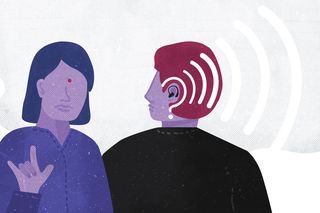
What It’s Like to Live With: a Son Who Can’t Speak or Hear
“His wish is to travel alone; I wish I could let him.”

What It’s Like to Live With explores the stories of people who see and experience every day a little differently.
When I was pregnant, people would always come and ask me whether I wanted a boy or a girl. I would tell them that I’d be happy if it were either, but I had one wish — for him or her to be born healthy. Then my son was born — healthy, the doctors told me. He weighed as much as newborns are supposed to and nothing made me happier. We came home and life changed — my life was all about him.
For the first few months, it was impossible to understand whether he was able to hear us or not. And for the first six months or so, he even babbled. But soon after, it got very unclear. We did a rattle test on him — shook it on either side of his ears to see whether he responded, and he didn’t. One of my greatest fears was coming true; a doctor confirmed he couldn’t hear but couldn’t put a pin on any cause. My instant thought was that people who can’t hear also can’t talk, but since he was babbling, there was no way to find out. In a few months, even that became clear. His speech wasn’t clear, and he couldn’t talk.
I wouldn’t say I was sad, but it was heartbreaking to see a child go through this. I wondered whether I was responsible for it in any way, but I knew I had to stop blaming and get on with it. I had to ensure I did everything for him to lead a life as normal as any other child would.
I went into research mode: sign language, schools, counselors, special-needs teachers, everything I could do. I enrolled myself to learn sign language; I became part of groups with other parents of children born with the same disabilities. Every day was a new learning, but most importantly, I had to teach myself every day that I had to be positive and happy. And so, I did.
I mastered sign language and, as my son was growing up, I kept teaching him, too. I decided to homeschool him; I guess I wasn’t ready to see him being discriminated against or made fun of if he were in a normal school. I think I didn’t have the strength for it. But I took him to play with our building children and left no opportunity for him to learn to socialize.
Related on The Swaddle:
What It’s Like to Live With: Vitiligo
Of course, he would get disheartened or upset about what he had to deal with. He did throw tantrums about not wanting to attend birthday parties or going for movies. I accepted it as a part of growing up; which child is not cranky about these things? Through sign language, I had taught him English and Hindi, so with subtitles on movies, things did become a little easier.
He kept growing up, life went on. We kept discovering and overcoming new hurdles every now and then. Sometimes it was difficult for him to convey what he was feeling, or if he was in pain. Sometimes, it was difficult to be in groups — say, a family dinner, where conversations would flow, but he wouldn’t catch on. It wouldn’t always be possible for me to fill him in on what people were talking about. I would always have to work my schedule around according to him. I couldn’t leave him alone or take him everywhere. My husband and I worked out our schedules and reached a point where we enrolled him in a school, for him to be able to give board exams.
The school made special efforts to employ a teacher who knew sign language and had the skills to take this forward. We could see that he was enjoying it, and we were only happy about it. He gave his board exams and scored 72%, which to us was more than 100%. It will be the proudest moment of our lives.
I started a small design business at home, and after he graduated in humanities, he said he’d like to join me and take this ahead. He is really good with technology, so he expanded my business through Facebook and Instagram. I share our profits with him, and he says he saves it all up to travel.
His wish is to travel alone; I wish I could let him. How many people will understand him, or be willing to help him? He’s achieved so many great things on his own, but my heart is still not ready to let him do this alone.
Anubhuti Matta is an associate editor with The Swaddle. When not at work, she's busy pursuing kathak, reading books on and by women in the Middle East or making dresses out of Indian prints.
Related


Stigma Against Addicts in Recovery Slows Down Their Progress: Study
